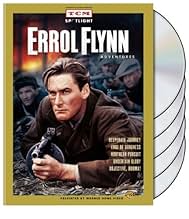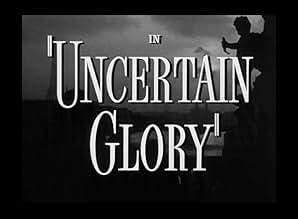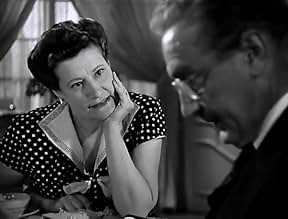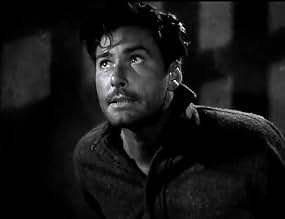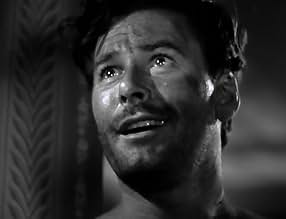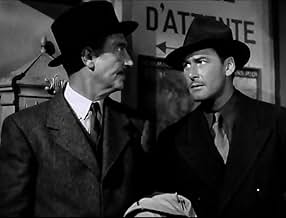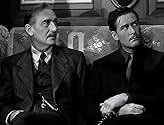AVALIAÇÃO DA IMDb
7,1/10
1,6 mil
SUA AVALIAÇÃO
Adicionar um enredo no seu idiomaAfter a career criminal is recaptured and knows he faces the guillotine, he offers to exchange his life for 100 hostages slated for execution by the Germans.After a career criminal is recaptured and knows he faces the guillotine, he offers to exchange his life for 100 hostages slated for execution by the Germans.After a career criminal is recaptured and knows he faces the guillotine, he offers to exchange his life for 100 hostages slated for execution by the Germans.
- Direção
- Roteiristas
- Artistas
Douglass Dumbrille
- Police Commissioner LaFarge
- (as Douglas Dumbrille)
Felix Basch
- Gestapo Major
- (não creditado)
Frederic Brunn
- German Soldier Reporting to Major
- (não creditado)
Nora Bush
- Townswoman
- (não creditado)
James Carlisle
- Townsman
- (não creditado)
Wallis Clark
- Razeau
- (não creditado)
Pedro de Cordoba
- Executioner
- (não creditado)
Fred Cordova
- Execution Guard
- (não creditado)
Avaliações em destaque
Errol Flynn is headed for "Uncertain Glory" in this 1944 film also starring Paul Lukas, Faye Emerson, Lucille Watson, Sheldon Leonard, and Jean Sullivan. The premise is similar to 1943's "Hangmen Also Die!" in one way - the Nazis have taken hostages who will die unless a saboteur is found. In this case, it's the saboteur who blew up a French bridge and killed Germans. Nazis have taken many men as hostages from a small nearby village. Parallel to this, an Inspector Bonet (Lukas) has finally tracked down a fugitive convicted of murder, Jean Picard (Flynn) who has slipped through France's fingers time and time again - the last time, just as he was about to get the guillotine, the site was bombed, and he escaped. A friend (Leonard) puts Bonet on his trail, and he's eventually caught. En route to another bout with the guillotine, Picard suggests that he'd rather die by firing squad - can't the Inspector say he is the saboteur, save the 100 men, and Picard can still meet his death? After some thought, Bonet agrees. Giving out a report of Picard's death, the name Dupont is given to Picard, someone on whom the Nazis cannot check. The real saboteur, whom they help escape, gives them the critical details - one especially important one - to tell the Nazis.
Raoul Walsh directed this film, which is sluggish at times and obviously just cranked out by Warners - probably one of those ones where Jack Warner whined to Walsh, you have to direct this movie for me. Walsh: Who's in it? Warner: Oh, I don't know. Just do it. According to Walsh, this type of thing went on all the time. It's actually a good story that with a little more in the way of production values could have been excellent.
Paul Lukas is wonderful as a gruff, honest inspector whose patriotism overcomes his honesty and who has bonded with this criminal in spite of himself even though he doesn't trust him and doesn't like him. Flynn does very well in his part - despite Jean's earnest sincerity, you know he wants nothing more than to get away from Bonet as soon as possible, and this whole thing is an elaborate ploy. But he has Bonet half-believing him. Lucille Watson plays a tough woman whose son is one of the hostages and who goes against the village priest to frame someone as the saboteur so her son can be freed.
One of the comments on this site complained about the French people speaking English. I repeat the theatrical rule: when citizens of a country are depicted in their country in a film or play, they would be speaking their own language, not English with a French accent. Therefore, no accent is necessary, Lucille Watson in this movie being the purest example of this. Flynn and Lucas have accents, of course - one just has to pretend they came from different parts of France.
All in all, the two stars make the film worthwhile.
Raoul Walsh directed this film, which is sluggish at times and obviously just cranked out by Warners - probably one of those ones where Jack Warner whined to Walsh, you have to direct this movie for me. Walsh: Who's in it? Warner: Oh, I don't know. Just do it. According to Walsh, this type of thing went on all the time. It's actually a good story that with a little more in the way of production values could have been excellent.
Paul Lukas is wonderful as a gruff, honest inspector whose patriotism overcomes his honesty and who has bonded with this criminal in spite of himself even though he doesn't trust him and doesn't like him. Flynn does very well in his part - despite Jean's earnest sincerity, you know he wants nothing more than to get away from Bonet as soon as possible, and this whole thing is an elaborate ploy. But he has Bonet half-believing him. Lucille Watson plays a tough woman whose son is one of the hostages and who goes against the village priest to frame someone as the saboteur so her son can be freed.
One of the comments on this site complained about the French people speaking English. I repeat the theatrical rule: when citizens of a country are depicted in their country in a film or play, they would be speaking their own language, not English with a French accent. Therefore, no accent is necessary, Lucille Watson in this movie being the purest example of this. Flynn and Lucas have accents, of course - one just has to pretend they came from different parts of France.
All in all, the two stars make the film worthwhile.
Excellent WW2 movie set in France about a convicted murderer named Jean Picard (Errol Flynn) who is about to be executed when an air raid allows him to escape. Police Inspector Marcel Bonet (Paul Lukas) tracks him down but, before he can bring him in, Picard offers to give his life to save the lives of some French hostages being held by the Nazis. Bonet agrees but the question is will Picard go through with it?
Raoul Walsh directed this underrated little gem from Warner Bros. Errol Flynn and Paul Lukas have a good chemistry. Most of the film centers around the relationship between their two characters. Lovely Jean Sullivan plays the naive young girl who falls for Flynn. Nice supporting cast includes Lucile Watson, Dennis Hoey, Sheldon Leonard, and Faye Emerson. A really good war drama that raises some nice moral questions, as well as having doses of humor and even some romance. And, of course, the added historical value many of these films have. WB is probably my favorite studio of the '30s & '40s and their war films are a good example of why. They made the best and most interesting movies to help the war effort. Always with good actors, writers, directors, and a solid, reliable production.
Raoul Walsh directed this underrated little gem from Warner Bros. Errol Flynn and Paul Lukas have a good chemistry. Most of the film centers around the relationship between their two characters. Lovely Jean Sullivan plays the naive young girl who falls for Flynn. Nice supporting cast includes Lucile Watson, Dennis Hoey, Sheldon Leonard, and Faye Emerson. A really good war drama that raises some nice moral questions, as well as having doses of humor and even some romance. And, of course, the added historical value many of these films have. WB is probably my favorite studio of the '30s & '40s and their war films are a good example of why. They made the best and most interesting movies to help the war effort. Always with good actors, writers, directors, and a solid, reliable production.
Right after Flynn's rape trial Warner put him in "quickie" inexpensive films not knowing how the public would respond to Flynn films. Uncertain Glory was one of them. Most reviewers of the time panned the film as a minor Flynn vehicle and heroic Flynn nonsense. However, as time has passed some modern day reviewers have re-evaluted this film and some have commented that Flynn gives a really good performance in a pretty darn good cat and mouse drama. And I totally agree. The story is interesting and the interplay between Flynn and Oscar-winning(The Watch on the Rhine) Paul Lukas is terrific. I think this is maybe Flynn's most underrated film. Whenever I watch it I imagine by Flynn's character the ending could have gone quite different and been more unpredictable but knowing the times(1944) and still in the midst of WWII the ending had to be what it was... Patriotic. Again, I think "Uncertain Glory" is a very underrated Flynn movie. *** of **** rating...easy.
Despite being quite a fan of Errol Flynn's, I had somehow managed to go forty years without seeing this movie, largely on the basis of its poor critical reputation. I always loved Flynn's swashbuckling, his insouciance, and especially his poignant performances near the end of his career in "The Sun Also Rises," "The Roots of Heaven," and "Too Much, Too Soon." I expected nothing from "Uncertain Glory," but a clip in a recent Flynn documentary caught my eye with what seemed to be a quite real and touching performance. I finally saw the film tonight and was impressed far beyond expectations. Flynn always harbored a hope of being respected as a dramatic actor, and though I think he achieved that in the previously mentioned later films, I was surprised to find in this 1944 performance a richness and texture every bit the equal of his best dramatic work. The film itself has, like most American movies of its period, certain conventions and unrealities which must be accepted (such as the variance in accents and some melodramatic plot devices), but it seemed to me to be quite believable and realistic within those confines. I was impressed by Paul Lukas, never a favorite of mine in particular, and the story kept me quite involved. Elements of it were quite moving. But Flynn quite simply overwhelmed my every expectation, and I suggest that this film might actually be reconsidered and included among the best pictures of his career. It's certainly one of his best performances.
Errol Flynn always wanted to prove that he was a dramatic actor of range, not an athletic non-entity who was always demonstrating his abilities as a horseman, a fighter, or a swordsman. That his best adventure films did show him as more than just an acrobat he barely understood. He wanted to play normal types. But normal types look more like Walter Matthau or Paul Muni or Allan Jenkins - they are not the strikingly handsome Flynn.
In 1944 Flynn did this film which was a war picture but not like DIVE BOMBER or OBJECTIVE: BURMA. The film was about a French criminal who had committed a murder and was tried and convicted for that homicide. He is able to escape the guillotine when a bomb hits the prison just as the execution is about to occur. He flees, and manages to get into the countryside. Pursuing him is Paul Lucas, the French police inspector who arrested him originally. Lucas finds Flynn, but at that time an act of sabotage against the Nazis occurs. When the Nazis threaten to kill 100 French hostages unless the saboteurs appear, Flynn offers Lucas a "devil's" choice: If Lucas will not act for the next few days, Flynn will surrender himself to the Nazis as the saboteur (he prefers being shot by a firing squad rather than being guillotined). Lucas has little real choice - unless he is willing to do the same thing instead of Flynn. But will Flynn keep his word or not? As Flynn meets a young girl and finds that they can flee away together, the audience wonders if he'll do the heroic thing or not.
Flynn is pretty good in this cynical part. It is obvious, once he makes the offer to Lucas, that he really planned not to go through with it. It is also true that as the moment of truth arises he gradually sees the hideous tragedy that his self-interest is likely to cause many families. The glimpse at occupied French society is also good, showing the victims and the collaborators. It is almost as good as the picture of that society in THIS LAND IS MINE.
Yet the film, produced by a company that Flynn was involved in, and selected by him, failed at the box office. The public did not quite accept a thinking man's Errol Flynn instead of the adventurous sexy star of THE SEA HAWK or GENTLEMAN JIM. It set back further attempts by Flynn to find straight dramatic parts. It also verified that Jack Warner, Flynn's studio boss, was a really smart man in knowing what the public liked or did not like for their stars.
In 1944 Flynn did this film which was a war picture but not like DIVE BOMBER or OBJECTIVE: BURMA. The film was about a French criminal who had committed a murder and was tried and convicted for that homicide. He is able to escape the guillotine when a bomb hits the prison just as the execution is about to occur. He flees, and manages to get into the countryside. Pursuing him is Paul Lucas, the French police inspector who arrested him originally. Lucas finds Flynn, but at that time an act of sabotage against the Nazis occurs. When the Nazis threaten to kill 100 French hostages unless the saboteurs appear, Flynn offers Lucas a "devil's" choice: If Lucas will not act for the next few days, Flynn will surrender himself to the Nazis as the saboteur (he prefers being shot by a firing squad rather than being guillotined). Lucas has little real choice - unless he is willing to do the same thing instead of Flynn. But will Flynn keep his word or not? As Flynn meets a young girl and finds that they can flee away together, the audience wonders if he'll do the heroic thing or not.
Flynn is pretty good in this cynical part. It is obvious, once he makes the offer to Lucas, that he really planned not to go through with it. It is also true that as the moment of truth arises he gradually sees the hideous tragedy that his self-interest is likely to cause many families. The glimpse at occupied French society is also good, showing the victims and the collaborators. It is almost as good as the picture of that society in THIS LAND IS MINE.
Yet the film, produced by a company that Flynn was involved in, and selected by him, failed at the box office. The public did not quite accept a thinking man's Errol Flynn instead of the adventurous sexy star of THE SEA HAWK or GENTLEMAN JIM. It set back further attempts by Flynn to find straight dramatic parts. It also verified that Jack Warner, Flynn's studio boss, was a really smart man in knowing what the public liked or did not like for their stars.
Você sabia?
- CuriosidadesErrol Flynn was criticized for playing heroes in World War II movies. Tony Thomas in his book 'Errol Flynn: The Spy Who Never Was' states that Flynn had tried to enlist in every branch of any armed services he could but was rejected as unfit for service on the grounds of his health. He had a heart condition, tuberculosis, malaria and a back problem. Flynn felt he could contribute to America's war effort by appearing in such films as Revolta! (1943); Perseguidos (1943); Demônios do Céu (1941), Um Punhado de Bravos (1945) and Três Dias de Vida (1944). Reportedly, Flynn was at his most professional and co-operative he ever was whilst working on Second World War movies. The studios apparently did not diffuse the criticism of Flynn's state-of-health as they wished to keep it quiet for fear of his box-office draw waning.
- Erros de gravaçãoAbout 1:20 into the film, there is a scene where the French police are coming into the town at night. One, on a motorcycle, rounding a corner, seemingly slips on the wet cobblestones and crashes in front of the camera - the shadow of his head flashes across the bottom of the screen and the sound of his presumed crash can be heard.
- Citações
Jean Picard: [indignantly to the barber just before he is to be sent to face the guillotine] My head comes off as it is!
- ConexõesFeatured in The Adventures of Errol Flynn (2005)
- Trilhas sonorasLa Marseillaise
(1792) (uncredited)
Music by Claude Joseph Rouget de Lisle
Variations in the score often
Principais escolhas
Faça login para avaliar e ver a lista de recomendações personalizadas
- How long is Uncertain Glory?Fornecido pela Alexa
Detalhes
- Data de lançamento
- País de origem
- Idiomas
- Também conhecido como
- Três Dias de Glória
- Locações de filme
- Escondido, Califórnia, EUA(vineyard scenes)
- Empresa de produção
- Consulte mais créditos da empresa na IMDbPro
- Tempo de duração
- 1 h 42 min(102 min)
- Cor
- Proporção
- 1.37 : 1
Contribua para esta página
Sugerir uma alteração ou adicionar conteúdo ausente


